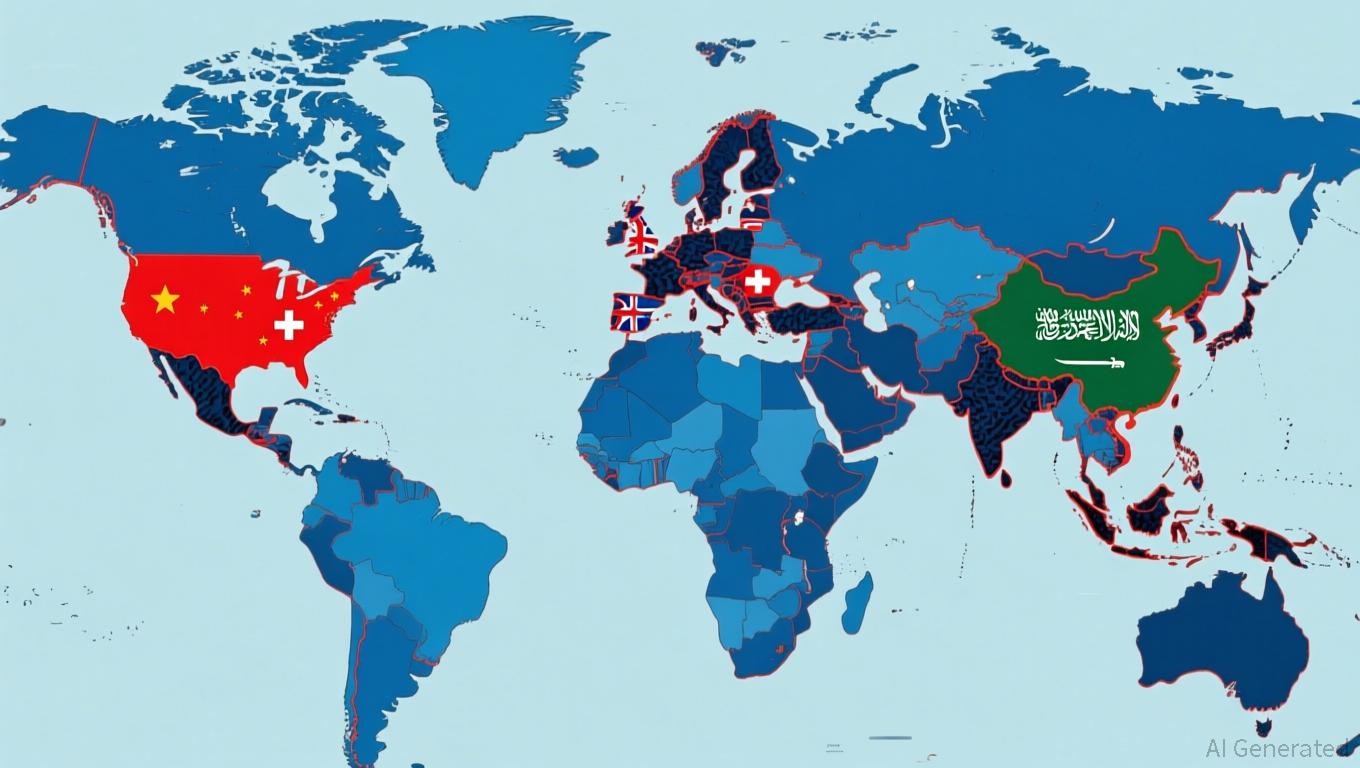Cardano News Today: While ADA Faces Challenges, Mutuum's Robust DeFi Approach Draws $18.9M During Presale
- Mutuum Finance (MUTM) raised $18.9M in Phase 6, with token price rising 250% to $0.035 amid strong demand from 18,200 holders. - The project combines P2C/P2P lending with smart contract automation and a buy-and-distribute mechanism to create a deflationary, non-custodial DeFi alternative. - CertiK/Halborn audits and Q4 2025 testnet plans highlight security focus, while 45.5% token allocation to presale and card-based payments boost accessibility. - MUTM's $0.04 Phase 7 price hike and $0.06 launch target
Mutuum Finance: A Rising Force in DeFi for 2025
Mutuum Finance (MUTM) has quickly established itself as a prominent player in the decentralized finance sector for 2025. The project has captured significant attention with more than $18.9 million raised. The MUTM token, initially offered at $0.01, has surged by 250% to $0.035 in Phase 6 and is set to increase further in the upcoming stage. With 95% of the current phase tokens already distributed, over 18,200 holders have joined, reflecting strong enthusiasm for Mutuum’s practical and utility-focused approach.
Innovative Lending Architecture
Mutuum’s roadmap introduces a two-tier lending framework that merges Peer-to-Contract (P2C) liquidity pools with Peer-to-Peer (P2P) borrowing. This system leverages smart contracts to streamline loan issuance and liquidation, offering a transparent, non-custodial alternative to conventional credit solutions. A standout feature is the protocol’s buy-and-distribute mechanism: a share of platform fees is used to repurchase MUTM tokens from the market, which are then distributed to mtToken stakers. This creates a deflationary effect directly linked to platform usage.

Commitment to Security and Expansion
Security remains a top priority for Mutuum Finance. The project has achieved a 90/100 Token Scan score through a CertiK audit and is undergoing continuous smart contract reviews by Halborn Security. These measures align with the planned Q4 2025 testnet launch, which will introduce the V1 protocol on the Sepolia testnet. The rollout will include liquidity pools, mtToken functionalities, and support for both ETH and USDT. Additionally, Mutuum has revealed plans for a stablecoin pegged to the US dollar, backed by over-collateralized loans, further expanding its DeFi offerings.
Competitive Edge and Community Engagement
In the current market, MUTM is emerging as a challenger to established names like Cardano (ADA), which has faced downward trends and technical hurdles. Unlike ADA, which is trading below major moving averages, Mutuum has a clear focus on utility. The project’s daily leaderboard, which rewards top contributors with $500 in MUTM, has heightened community involvement.
Tokenomics and Accessibility
Of Mutuum’s total 4 billion token supply, 45.5% has been allocated to early supporters. Over 790 million tokens have already been purchased. To enhance accessibility, the team has introduced card payment options. This liquidity strategy, combined with a roadmap centered on efficiency and robust security, positions MUTM as a strong contender among DeFi projects for 2026.
Looking Ahead
With the current phase nearing full allocation, the next stage will see the token price increase to $0.04, and the official launch is set at $0.06. The upcoming Q4 2025 testnet deployment and completion of the Halborn audit mark a pivotal period for Mutuum Finance. Investors are optimistic about the project’s ability to reshape traditional lending, thanks to its structured, security-driven approach amid the ever-changing crypto landscape.
Disclaimer: The content of this article solely reflects the author's opinion and does not represent the platform in any capacity. This article is not intended to serve as a reference for making investment decisions.
You may also like
Switzerland Delays Crypto Information Exchange Pending International Coordination
- Switzerland delays crypto tax data sharing with foreign nations until 2027, citing unresolved CARF partner agreements. - The OECD's 2022 framework requires member states to exchange crypto account details, but 75 countries including the EU and UK face implementation challenges. - Transitional measures ease compliance burdens for Swiss crypto firms while awaiting finalized international data-sharing protocols. - Major economies like the U.S., China, and Saudi Arabia remain outside CARF due to non-complian

Bitcoin Updates: SGX Addresses Offshore Perp Shortfall as Bitcoin Decline Increases Demand for Hedging
- SGX launched Bitcoin and Ethereum perpetual futures, becoming a first-mover in regulated onshore crypto derivatives to meet institutional demand. - The $187B/year perp market, dominated by Asia, now gains a regulated alternative to offshore platforms with SGX's 22.5-hour trading window. - Perps enable hedging during Bitcoin's 2025 downturn, with SGX's margin-call system prioritizing investor protection over instant liquidations. - Regulatory caution limits access to accredited investors, aligning with gl

Bitcoin News Update: Institutional ETF Adjustments Challenge Key Bitcoin Support Thresholds
- Analysts warn Bitcoin faces 25% drop risk if key support levels fail amid shifting institutional ETF dynamics. - Texas's $5M IBIT purchase highlights growing government interest, but ETFs fall short of direct BTC ownership criteria. - Technical analysis shows Bitcoin trapped in a broadening wedge pattern, with breakdown below $80,000 risking $53k decline. - Institutional rebalancing sees $66M IBIT outflows vs. $171M FBTC inflows, signaling tactical ETF rotation over accumulation. - Abu Dhabi's $238M ETF

XRP News Today: IMF Cautions That Rapid Tokenized Markets Could Intensify Crashes in the Absence of Regulation
- IMF warned tokenized markets like XRP could worsen flash crashes without regulation, citing risks from decentralized systems lacking traditional safeguards. - Report acknowledged tokenization's potential to cut cross-border payment costs but highlighted volatility risks from rapid liquidity loss seen in crypto markets. - SEC's approval of crypto ETFs signals growing institutional acceptance, though regulators emphasize oversight frameworks to mitigate systemic risks. - IMF proposed a global digital marke
